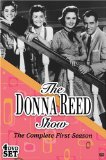| Reviews & Columns |
|
Reviews DVD TV on DVD Blu-ray 4K UHD International DVDs In Theaters Reviews by Studio Video Games Features Collector Series DVDs Easter Egg Database Interviews DVD Talk Radio Feature Articles Columns Anime Talk DVD Savant Horror DVDs The M.O.D. Squad Art House HD Talk Silent DVD
|
DVD Talk Forum |
|
|
| Resources |
|
DVD Price Search Customer Service #'s RCE Info Links |
|
Columns
|
|
|
Donna Reed Show: The Complete First Season, The
Author's note: This review is based on advanced screener discs - not the final shelf product. Subsequently, ratings on the video and audio are not final, nor is there any mention of extras not found on the discs (such as an episode guide or an informational brochure) nor of the disc's packaging. When and if I receive the final shelf product, I will amend the review.
Just in time for its 50th anniversary, Arts Alliance America has released The Donna Reed Show - The Complete First Season, a four-disc, 37-episode (!!!) collection of one of the most charming, accomplished sitcoms of the 1950s and 1960s. Starring Oscar-winner Donna Reed as the prettiest, most together TV mother of the family-obsessed '50s, The Donna Reed Show - The Complete First Season is a nimble amalgamation of professional gloss, smartly written lines, perfect casting, and some surprising twists and turns on the traditional Cold War American sitcom genre.
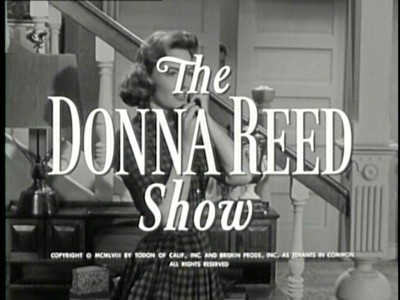
Set in the fictional Midwestern town of Hilldale, The Donna Reed Show focused on the Stone family, a typical American family. Donna Stone (Reed), a former nurse, was the beautiful, even-tempered, and empathetic wife to pediatrician Dr. Alex Stone (Carl Betz), and patient, understanding mother to eldest Mary (Shelley Fabares) and young son Jeff (Paul Petersen). Alex maintained his private practice at his home office, while he did double and triple duty as a researcher and as the Head of Pediatrics at the local hospital. Mary, the adorable high schooler, was a popular girl (never at a loss for a date on any given night) who had the same emotional ups and downs of any transitional teenager - a state of flux not exactly aided by her ornery, all-American younger brother Jeff, who took great delight in constantly tormenting her. Mary, to her credit, was equally adept at sweet-faced revenge, and gave as good as she got from the rowdy Jeff. Stories focused almost exclusively on the inter-relationships between the family members, with life's little daily adventures providing most of the comedy, and emotion, as the kind, good-natured Stones set out to live a happy, uniquely American way of life in their small town.
I haven't seen The Donna Reed Show since it used to play in heavy rotation on Nick at Nite - when that channel was still watchable - back in the mid-80s (I believe it was on their first-year schedule, and it ran for quite some time). Nick used to poke gentle fun at the show with humorous network promos for the series (often tied in with Donna baking a cake to solve a problem), an ironic view of the show that funny enough, fits right in with the show's own smart self-awareness. Often incorrectly lumped together with other '50s sitcoms (that were equally self-reflexive and smart) that were misread as bland, narrow-minded fantasies of unrealistic depictions of a "never-was" America, The Donna Reed Show was, like those other shows, quite the opposite: a charming, thoughtful, very funny slice of life depiction - shaped comedically, of course, for entertainment purposes - that accurately reflected millions of similar real American families. There were - and still are - families quite like the Stones (as much as it may astonish - and enrage - the snide and cynical haters of anything traditional in America). And thank god, too.
Yes, of course the series didn't depict the darker aspects of American society at the time. And no, there are no instances of rape, or pedophilia, or racism, or war, or economic or political struggle highlighted in this first season of The Donna Reed Show. But that conscious decision to avoid those supposedly more "important" issues (this was, after all, a Hollywood entertainment, not a documentary) doesn't negate the gentle truths that were illustrated on the series - gentle truths about love and family that are universal, and that need just as much (if not more) exposure to today's viewers as the more dark, tragic issues listed above. One only needs to look at the morass of questionable "family entertainments" on network TV today, filled with moral equivalencies for awful, uncivil behavior, with lewd, lascivious jokes delivered by kids that demean and cheapen childhood, and perhaps most disturbingly, with a general air of disrespect, of coarseness in how family members interact with each other, to see how far wholesome network TV fare has fallen in the last fifty years since The Donna Reed Show was on (with rapidly disappearing ratings across the board to prove it). Fifty years ago, families could safely tune into ABC at 9:00 o'clock on Wednesday nights to see the Stones live their lives in moderate, temperate good humor; today, families shouldn't go near that same time slot on ABC 's Wednesday (nor damn few other nights or times, either, for that matter), unless they want their sons and daughters to see something like current occupant Private Practice, a twitching, compromised, wholly modern mess whose sole purpose seems to be to inform women that they're totally incapable of finding happiness in their lives. You've come a long way, baby.
A scurrilous, cynical message, by the way, that would be anathema to Reed herself, who promoted women's rights both on and off the small screen. Now, naturally, today's card-carrying feminists would blanche at the women's "empowerment" messages found in The Donna Reed Show - particularly if they've never actually seen the show. The pop culture "Mom as domestic Superhero" view of motherhood in the 50s has been taking a beating at college campuses for decades now, but in The Donna Reed Show, it's an accepted fact. And one that the show itself pokes fun at numerous times. In quite a few episodes, other family members comment humorously on Donna's "perfectness" when it comes to being a mother and homemaker. She's almost always stylishly dressed, perfectly coiffed, and supremely composed and even-tempered (watch the opening title sequence, where she literally floats down those stairs) - a source of irritation and anxiety, at times, for her daughter, Mary. In the episode, Change Partners and Dance, Donna tells Mary that a woman needs charm (and brains) to get ahead in a man's world (a fact in 1958), which drives Mary insane because as soon as Mary follows Donna's suggestion - that Mary bring over a boy she's interested in - the boy is promptly dazzled by Donna's "perfectness." The show then humorously shows Donna parodying the exact opposite of her own stereotype, when she tries to be a sloppy, loud, aggressive housewife - one of the many self-reflexive episodes in The Donna Reed Show where the producers were more than willing to satirize the TV world they created. This open acknowledgment of the show's manufactured image of Donna as SuperMom is taken to an even higher degree in The Ideal Wife, where Donna, ticked-off that everyone thinks she's a pushover because she's so nice, decides to act not-so-nice, and promptly scares the hell out of everyone. While some today might think her apologies to everyone at the end is a cop-out of the story's central premise, I find it more an expression of that innate Midwestern politeness and civility that seems to be disappearing at a faster rate, year after year.
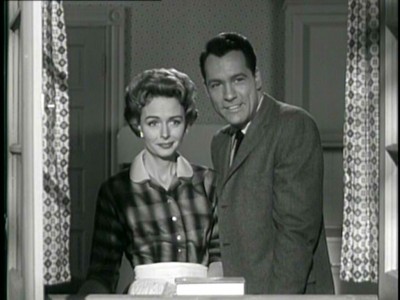
But it isn't all beauty and charm that concerns Donna, either. In the excellent Mary's Campaign, the notion that Mary may very well win the student body vice president's seat just because she's prettier and more popular than her thoroughly more qualified opponent, forces Donna to actually side (morally) with the other girl, and not her daughter. The screenplay is extremely well-written (as are almost all of The Donna Reed Show scripts), showing a delicacy of careful thought as Donna expresses her desire for Mary to win...but only for the "right" reasons (with Donna particularly upset when Mary feels the need to dress more provocatively, just to win votes, instead of being her normal self). And more importantly, the shows often highlight Alex's and Donna's belief that Mary and Jeff learn their lessons in life on their own, without Donna and Alex just "making" them believe a choice or decision is "right" or "wrong." Donna often is careful to impart to Mary that with Mary's beauty and charm comes a responsibility to use them wisely, such as in Mary's Double Date, when Mary rather callously plays two boys off each other for her own selfish amusement - an act that leads to Mary getting badly hurt, with both Donna and Alex "approving" of that hurt so she can learn a valuable lesson.
The Donna Reed Show is also fascinating for showing a sitcom 1950s dad who isn't bumbling, who isn't supremely cocksure about his fathering skills, and who most importantly, works his behind off at his job. Unlike that wonderfully surrealistic floater Ozzie Nelson on The Adventures of Ozzie and Harriett (which was on at 8:30, right before The Donna Reed Show on Wednesday nights), who was never depicted going to a job, pediatrician Alex Stone's doctor's office is right inside his house. And when he's not seeing a patient there, he's constantly interrupted in his familial pursuits by a phone call from a nervous mother, worried about her child. Quite a few episodes in The Donna Reed Show this first year revolve around the constant anxiety caused by whether or not Alex will be home for certain events. It's a fairly realistic view of a type of father rarely seen on 1950s sitcoms: a busy one outside the home.
Even more interesting, The Donna Reed Show doesn't just highlight Alex's absences as plot devices, but also as character development for the role. Alex, not unlike Ward Cleaver in the equally misunderstood and unfairly dismissed classic, Leave it to Beaver, is actually emotionally involved in his children's wellbeing, and critically, he's concerned and worried he's not cutting it as a proper dad (take that, Alan Alda and Phil Donahue!). In The Hike, Alex openly castigates himself to Donna about his feelings of inadequacy, as far as not being there for Jeff because of the constant, overriding demands of being a physician (Donna of course tells him that he is a good father, and that his work as a doctor is vital). In Guest in the House, a promised Thanksgiving football game trip is canceled by Alex because a patient calls, prompting Jeff to angrily snort, "What's the use of having a father?" (strong stuff for a 1950s sitcom). And in Tomorrow Comes Too Soon, Alex good-naturedly laments the fact that Donna can cry over the children's troubles, but that fathers can't; he states fathers feel the exact same things about their children that mothers do, but for what we assume are cultural reasons, they're not allowed to express them. These episodes and more (in Male Ego, Alex throws up his hands and admits that mothers, in small town America, get far more respect than fathers) paint a surprisingly "modern" view of fatherhood in 1950s sitcoms that I contend isn't all that surprising...if the pointy-headed critics of such programs would actually watch these series without simply regurgitating the same worn-out clichés they've read over and over again in other people's works, slamming the genre (...and small town America, and the civilized, normal people in '50s and '60s sitcoms, and...oh, you get the point).
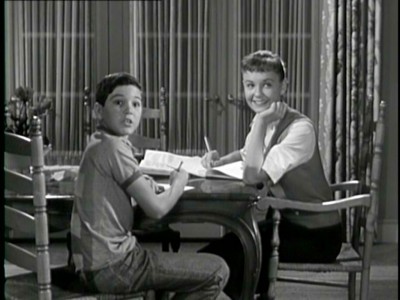
The relationships between Alex and Donna, and Jeff and Mary, may also strike new viewers as "unusual," if they've only heard of these shows in the context of their being constricted, repressive fantasies from the frigid '50s. Alex and Donna, contrary to the cliché that TV couples weren't having sex back in the '50s, have a playful, low-key sexual banter that's quite effective (I love it in Three Part Mother when Donna wakes up Alex with a sexy little ear bite - Mrs. Cleaver never did that to Ward). And it's not exactly hidden, either. Certainly the most obvious instance comes during the final scene of the final episode of this first season, when, after Donna admits that she flubbed receiving a doctor bill payment for Alex, Alex leeringly suggests, "I'll think of some way [for you] to settle it," while she happily perches on his knee. Often the notion of "feminine wiles" is brought up in these episodes (a notion, I'm sure, that drives uber-feminists insane), but what's charming about its implementation in The Donna Reed Show (or more correctly: the suggestion of its implementation) is the outright acknowledgment and celebration of its true power and frankly, attractiveness. In Advice to Young Lovers, both Donna and Alex mentally picture the unattractive mates they might have married, prior to meeting each other, with Alex playfully asserting that he didn't marry Donna for her smarts, but for her gorgeous good looks - an expression of male lust that mirrors her own healthy sexuality and one that obviously pleases her, given the big smile and kiss she plants on him. Of course, what's funny - and telling - about the scene is that they both already know how smart the other partner is; that's why they're free to admit the added bonus that they're attractive to each other, as well. In other words: a smart, healthy, sexually-active 1950s sitcom couple who not enjoy how the other one looks, but also a couple that's honest enough to admit physical attraction is a central element of their relationship. So much for the button-down '50s.
The kids in The Donna Reed Show are refreshingly normal, too. While the Beav and Wally were beautifully kind and caring towards each other in Leave it to Beaver (and believably so), out-and-out sibling fighting, as with most sitcoms from that era, was usually off-screen. In The Donna Reed Show, though, Jeff and Mary behave pretty much like kids hae always acted. Jeff is a pest to his older sister (he also breaks at least three windows this season, and he's not above pulling some real stunts, including going on a joyride with a friend and running away from the cops), and she, wrapped up in her own perfect little teenage world, can be insensitive and openly vindictive when she's a mind to be. They actually mix it up in one episode (with Jeff openly saying he's trying to break her arm), while name-calling is the norm throughout (I love it when Mary, in Change Partners and Dance, disgustedly sighs and implores her mother to just "smack" Jeff one, before she calls him a "revolting little freak" - that sound quite "modern," doesn't it?). But just as the fighting is real, the concern and love between brother and sister is honest, as well, in The Donna Reed Show, with the spunky Paul Petersen (letter-perfect as an all-American, real boy), and the seriously underrated Shelley Fabares (the kind of daughter any mother or father would dream of having - isn't it a pity she never connected with Walt Disney during his glory years?) switching effortlessly from comedy to tender emotion in scenes, like seasoned pros.
Carl Betz has what seems like a thankless role as Alex, but he's delightful as the slightly cynical, sarcastic father who understands all too well how lucky he is to have this kind of wife and family (I suspect Betz didn't get very much credit for what he was able to do here; these kinds of roles, far more difficult to play than most people realize, are often overlooked when it comes to understanding the craft that goes into playing them). As for Donna Reed, well...what more can one say? An Oscar -winner for playing a prostitute in From Here to Eternity (the subtextual knowledge of which must have thrilled male viewers just a little bit when they wondered what Donna Stone was really like), Reed offers a graceful, confident, sexy - and oftentimes quite hilarious - presence to The Donna Reed Show that makes today's female TV stars look like nervous, chattering twits by comparison. You can concentrate on Reed alone to get a Masters' course in small-screen light comedy acting (her reaction shots are almost eerily precise), a skill that is only amplified when she subtly pulls out the acting stops in a dramatic scene. In a touching Christmas episode, A Very Merry Christmas, Donna tries to find the true meaning of Christmas by helping out an old hospital worker (Buster Keaton, in an effective turn) who's in charge of putting on a small Christmas party for the lonely little patients in the children's ward. There's a final image of Donna and Alex, looking at the angel on the Christmas tree while singing Silent Night, where Reed goes from happily smiling at the gift she's been given - the gift of knowing what Christmas really means - to putting on the most amazingly enigmatic, searching look - a look I'm still thinking and wondering about today. It's a truly beautiful moment, and one that's a testament to this wholly underrated actress.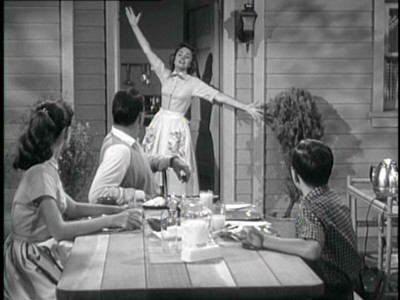
Here are the 37 (!), one-half hour episodes of the four-disc set, The Donna Reed Show - The Complete First Season (almost all of which time out at 25:50):
DISC ONE
Weekend Trip
Alex and Donna plan for a weekend ski trip with Jeff and Mary, but Alex's doctor duties get in the way...until Donna diagnoses the problem with Alex's problem patient.
Pardon My Gloves
Donna is all set to appear in the local "Podium Players" theatrical group, until her family suggests she tone down her emoting.
The Hike
Alex has to break a date to take Jeff's scout group on a hike, so Donna steps in to show them a woman is just as able as a man in the forest (the best joke of the whole season? She caters the hike).
The Male Ego
Alex feels like his opinion doesn't mean anything when Mary delivers a town-changing speech about how wonderful Donna is as a mother.
The Football Uniform
Donna has to do some fast thinking to help Jeff buy a football uniform, while sticking to her and Alex's plan not to keep bailing out the kids' problems with money.
The Foundling
A baby is left on the Stones' doorstep, and rather than turn it over to the authorities, Mary tries to track down the parents.
Three Part Mother
SuperMom Donna Stone simply can not be in three places at once. Or can she?
Change Partners and Dance
Donna's plan for Mary to snare a boy backfires when he winds up liking her more than Mary.
Dough-Re-Mi
Jeff is far more adept at getting a world-famous pianist to perform for one of Donna's charities than Donna is: he simply dates the pianist's daughter.
Guest in the House
An angry young boy winds up at the Stones for Thanksgiving, who learns how to love his father again after the patient ministrations of Donna and Alex.
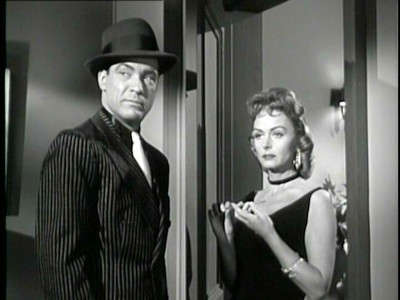
DISC TWO
The Baby Contest
The last thing an up-and-coming pediatrician needs in a small town is take favorites with his patients. That's why he's not looking forward to judging Donna's committee's most beautiful baby contest.
The Beaded Bag
Donna is genuinely offended when she realizes that Alex thinks she conned him into buying an expensive bag she admired.
The Busy Body
Mary's Uncle Fred says exactly what's on his mind...much to the detriment of the Stones.
A Very Merry Christmas
Mary feels overwhelmed with holiday chores, until she discovers the true meaning of Christmas.
Mary's Double Date
Mary has two boys on a string...until she has none to go with to the prom.
Nothing But the Truth
David Barker, the young boy who became friends with the Stones over Thanksgiving, invites himself over for his birthday. Only it's not his birthday.
It's the Principle of the Thing
Mr. Popkin needs money to have his son treated by Alex, but he won't accept charity, so he opts to do some odd jobs around the Stone house.
Jeff vs. Mary
It takes a newly installed intercom in the Stone house to convince Jeff he's as loved by his parents as Mary is.
Have Fun
Trying to make Mary feel better after a bad date, Alex and Donna recount their first date -- very differently.
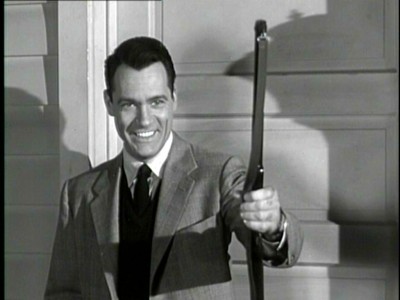
DISC THREE
Donna Plays Cupid
Alex's doctor friend Bo is a bachelor, which means an easy target for Donna's matchmaking scheme.
Love They Neighbor
Next-door-neighbors the Wilgus are at it again; this time it's their disastrous 20th wedding anniversary.
The Report Card
Jeff is just fine being a "C" student, but that doesn't sit well with Donna.
Boys Will Be Boys
David Barker shows up yet again, and this time gets in trouble with Jeff when they stay up too late at the Stones.
The Ideal Wife
Donna finally snaps at being called "perfect" all the time, and really unloads on everyone.
Mary's Campaign
Mary is running for student body vice president, but her opponent is more qualified...and less popular.
The Flowered Print Dress
Donna and Alex discover each other all over again when they see newlyweds and an old married couple, interact.
April Fool
Teen idol Buzz Barry (James Darren) is hiding out at the Stones - and Mary can't say a word about it to her friends.
The Parting of the Ways
When the Stones discover that a couple might be splitting up, their own interest in the marriage almost ruins their own.
The Hero
Alex's old college roommate stops by for a visit, but the life of a former football star is far sadder than Alex ever realized.
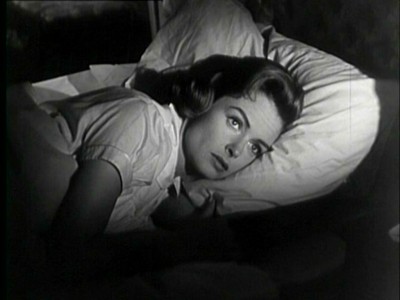
DISC FOUR
Do You Trust Your Child?
Everyone thinks Donna is the expert on raising kids, until Mary brings home an unsuitable potential boyfriend.
Grateful Patient
When Alex helps out the bickering Wilguses next door, he doesn't realize there's a potential to make some serious money involved.
The Testimonial
Old Dr. Jason is retiring, and everyone wants to give him a proper send-off. But does he really want to retire?
Miss Lovelace Comes to Tea
When Donna's duties for a charity become too much, the Stones hire a housekeeper. A bad one.
Tomorrow Comes Too Soon
Alex and Donna plan on a weekend without the kids. But soon, Donna misses them terribly.
Advice to Young Lovers
Mary's difficulty with a boyfriend prompts another flashback for Donna and Alex, as they recount how they almost married different people.
Operation Deadbeat
Donna tries to collect all the money that's owed to Alex, while Jeff goes to work paying off his debt to Mary.
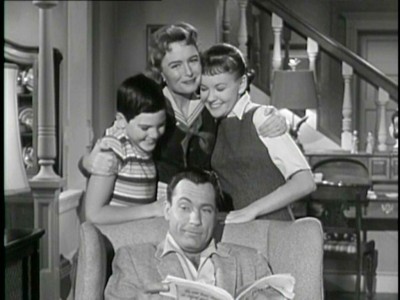
The DVD:
The Video:
The full-frame, 1.33:1 black and white video transfers for The Donna Reed Show - The Complete First Season are quite respectable at times, with a relatively sharp image and a creamy gray scale. However, there are quite a few instances of noticeable vertical scratches running through some of the prints at times, along with some contrast issues and grain, at times. Still, overall, these look better-than-expected on a smaller monitor. Compression issues do pop up (and there's some interlacing that's noticeable on a bigger monitor), but stepping down in monitor size lessens the impact. As to the length of these episodes. Most of the episodes in The Donna Reed Show - The Complete First Season run exactly 25:50. Rarely does the final music "end," but rather fades out abruptly (on the final notes, though). As well, a couple of episodes include a different title graphic over the opening title sequence that I suspect (?) might be an indication of a syndication version.
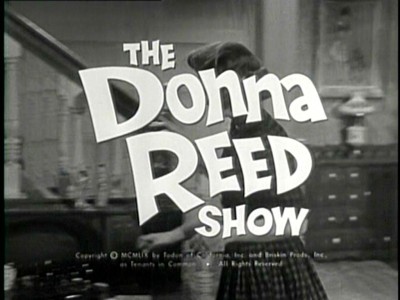
Nothing really jumped out at me as being missing here (all the episodes flowed fairly well as to their editing), but not being an expert on the show, I can't say if minor cuts have or have not been made. Take the running times as your indicator of that.
The Audio:
The English mono audio track accurately reflects the original broadcast presentation of The Donna Reed Show - The Complete First Season. Dialogue is cleanly rendered, while minor hiss is noticeable, but not intrusive. Subtitles are included.
The Extras:
Two minor extras are included on The Donna Reed Show - The Complete First Season set. First, there's a brief black and white network promo for the show (which is obviously from a later season). And second, there's a photo gallery with some snaps from the series' production. Not too exciting.
Final Thoughts:
The Donna Reed Show doesn't need you to make fun of it; it was already slyly winking at itself right from the start. But that's not to say that the series is a spoof or take-off on other 1950s sitcoms. It's remarkably "modern," for lack of a better word, within its '50s network sitcom structure, offering a rewarding look at a healthy, loving, average American family that are, in the words of chief wiseacre Jeff Stone, "too darn smart " for their own good. Far from bitterly clinging to their guns and religion, the positive, happy, Midwestern Stones learn hopeful messages about family, about personal responsibility, about playing by the rules, and most importantly, about love - all while fighting and laughing their way through their thoroughly ordinary (in the absolute best sense of the word) lives. Certainly an iconic show from that time period, The Donna Reed Show is also one of its most misunderstood. I highly recommend The Donna Reed Show - The Complete First Season.
Paul Mavis is an internationally published film and television historian, a member of the Online Film Critics Society, and the author of The Espionage Filmography.


|
| Popular Reviews |
| Sponsored Links |
|
|
| Sponsored Links |
|
|
| Release List | Reviews | Shop | Newsletter | Forum | DVD Giveaways | Blu-Ray | Advertise |
|
Copyright 2024 DVDTalk.com All Rights Reserved. Legal Info, Privacy Policy, Terms of Use,
Manage Preferences,
Your Privacy Choices | |||||||









